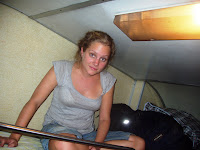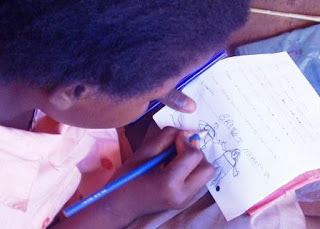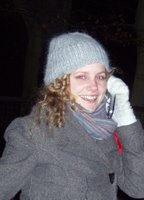I’m Sally-Anne’s cousin, Lucy and am currently on a gap year before starting uni. After doing a whole lot of nothing for the beginning of my year I thought I had better do something worthwhile, so I came out to visit Sally-Anne for a month in Zambia.
I’ve done a lot whilst I’ve been here, from horseback riding at Lake Malawi to visiting Victoria Falls in Livingstone. I have loved being a tourist in Zambia and doing all the activities that are available but I have also loved seeing another side of Zambia; the everyday lives of the local people. Lives that I wouldn’t have been able to see without having Sally-Anne living here as a local.
The first part of my stay was spent visiting sights along Lake Malawi and staying in various lodges, with Sallyanne, Henry and my aunt and uncle. Highlights of my time there included horseback riding through the woods and then going into the sea on the horses at Kande Beach,
.JPG)
and a day trip which involved a walk through small local villages at Nkhata Bay, then down to a beautiful cove where we sunbathed, snorkelled and ate freshly caught fish cooked by our guide on the beach.  Our day ended with a trip out on our guides’ boat where we waited for fish eagles to swoop down from the cliffs to catch the fish thrown by own guide and to pose for photos!
Our day ended with a trip out on our guides’ boat where we waited for fish eagles to swoop down from the cliffs to catch the fish thrown by own guide and to pose for photos!

On our way back down the lake we stopped at Nkhotakota Pottery for the night and spent an hour learning how to make our own pots (which were terrible and looked nothing like the instructor’s) and had the chance to buy some of the hand made pottery. I now have two African cups for university which no-one can claim as theirs unless they’ve also been to the pottery in Malawi!
Something I noticed in Malawi was the amount of people on the roads walking with heavy loads of supplies balanced on their heads or pushing bikes loaded high. It’s incredible the distances these people walk or cycle to get from one town or village to another, and they do it because they have to. Another thing that astounds me is the number of people who can fit in the back of a truck. Because there’s little public transport people pile in pickup trucks, and I’m really surprised the vehicles don’t topple over backwards from the weight crammed in the back. Not to mention the size of the potholes here that you have to swerve to avoid, plus the fact that the most of the roads here are just dirt tracks; it can make travelling a bit difficult for most vehicles, yet people still manage to do it.
During my stay here we also spent three days at South Luangwa so we could go on safari. This was brilliant; when we first got there we sat waiting by the bar for our talk of what we would be doing during our stay, and whilst sat having lunch we saw a family of giraffe walking down towards the river, not far from us. It’s so surreal to see these animals I’ve only ever seen in zoos just walking around only a few hundred metres from me. I had many experiences like that throughout my stay in Zambia, both on safari and just driving along the road or walking through a car park. Every time I saw a wild animal I got very excited and had to explain to locals and taxi drivers, when they asked why I was so pleased to see these animals, that we don’t have animals like these just walking round England, only in zoos. My highlight of safari was seeing a female lion with her three young cubs, as well as getting to see a male lion up close. At one point a little too close as our vehicle went down a ditch and the lion walked up a verge alongside so that he was at eye level with us, much to the fright of me as I was sat on the edge.

I also spent a few days down in Livingstone. As Sally-Anne had already been their with her parents the week before I got to Zambia I decided to still go alone because I couldn’t miss seeing Victoria falls. To get there I had to get two buses first to Lusaka then to Livingstone the following morning. After hearing what my aunt and uncle had told me about these buses I was really dreading the journey. I was imagining them to be the tiny small mini busses you often see crammed and with people hanging out the side.
A guy I met in Livingstone said he spent a whole journey in one of these buses with a woman’s right breast and half her thigh on his lap, along with her shopping bag that she couldn’t hold because she was carrying a chicken with her! Another person I met calls them the ‘here hold my baby buses’. Need I say more about why I was partly dreading this six hour journey!
Luckily the coaches I was on weren’t that bad, but weren’t that great either. The seats are incredibly narrow so if you have a larger person sat next to you then you have one of their arms and legs squashing into yours. Fortunately for me, I find it very easy to sleep when travelling so I slept most of the time. However, this was made slightly more difficult by the TV which was incredibly loud and playing two hours of Zambian choir music. I enjoyed the first few songs but after about half an hour was forced to get my iPod out.
I arrived in Livingstone on Saturday and a friend of Sally-Anne's who works in Livingstone had arranged to take me to a HIV concert that night. It was meant to be a really big concert with Zambia’s main acts performing. It was a fun experience, yet I needed a bit of wine for it. Not surprisingly there were very few white people there and we were stood with the crowd of people who knew every word and dance to all the songs. Luckily the wine helped in making me feel not so out of place! It was something different though and I enjoyed having the opportunity to see a Zambian concert, and it was for a good cause after all.
I went to see Vic falls the following day and it was incredible. But I was rather stupid and thought I wouldn’t need to hire one of the rain coats. After all, the people coming back up didn’t look that wet and a group before me were going down without them, so I set of without one. On my way along the path a woman looked at me in my little top and linen trousers and just said “you’re brave”. That was when I first realised I might have made a big mistake. The people I saw who weren’t that wet had not in fact been all the way across the bridge and along the edge of the cliff so avoided most of the spray. So by the time I’d got back to the beginning of the path I was completely drenched from head to toe and it took me three hours to dry off! But it was worth it.
Having Alexa, Sally-Anne’s friend who lived in Livingstone, there meant I got to do something tourists didn’t. One morning I went with her to her work, which is a block housing her offices, a small school block, and a few locals who live their. Among the people that lived there were five children; these children were special because Alexa had worked to get four of the five sponsored by English people so that they could afford to go to school. When we first got there they ran up shouting Alexa’s name and gave her a big hug then came and hugged me too. A little boy called Junior and a girl called Sheila grabbed hold of my hand and I instantly fell in love with them all. As it was half term we spent the morning learning to write a few letters, singing songs and playing games. I loved it and was pleased I got to see a different side of Zambia that unfortunately many tourists and visitors missed, just as much as any bungee jump or gorge swing.

My sleeping on the coach on the way back to Chipata was also affected. Firstly, by a strong smell of fish that the person opposite was carrying with them and secondly by a man who came and sat next to me halfway through the journey. It was nice to have a bit of conversation for a change but after an hour and a half of comparing everything there is in Zambia to that in England he wasn’t really getting the hint that I just wanted to go back to sleep; so I spoke with this stranger the whole way back to Chipata about every aspect of the education system, buildings, food, culture, religion etc of both countries, for nearly three hours. One thing I find very funny here is how when I mention that I’m English, to certain people I’ve met, they ask me how the Queen is? I have to explain to them, much to their astonishment, that I haven’t actually met her and that most people in England haven’t either. This is something they don’t seem to understand, like the Queen makes personal visits round to peoples houses for cups of tea and biscuit.
When I got back to Chipata I phoned Ruben, the taxi driver to pick me up. When he arrived his previous fare got out and went round to open the boot. I thought he was opening it so that I could put my bags inside, but when I looked down there was a black goat staring up at me. The previous customers just lifted it out and walked off carrying it by the legs and Ruben got back in the car like this wasn’t weird at all! It may not have been for anyone else but I certainly found it weird, yet funny and just got in the taxi slightly baffled but laughing quietly to myself.
Overall I have had a brilliant time here in Zambia and although after a month I’m slightly homesick, I’m also going to be really sad to have to leave and go home. I now have my mind set that I shall make sure to do more travelling whenever I get the chance because if I have the opportunity to have another experience like this I wouldn’t miss it for the world!

 Unfortunately our train stopped about 20 hours short of its destination in a really bleak town in southern Tanzania. We were lucky and hoped straight on a bus to the nearest big town.
Unfortunately our train stopped about 20 hours short of its destination in a really bleak town in southern Tanzania. We were lucky and hoped straight on a bus to the nearest big town.


 It was all worth it for a couple of days mountain biking in the Luwawa Forest with local residents little Bob and Leon the beast as guides!
It was all worth it for a couple of days mountain biking in the Luwawa Forest with local residents little Bob and Leon the beast as guides!










.JPG)
 Our day ended with a trip out on our guides’ boat where we waited for fish eagles to swoop down from the cliffs to catch the fish thrown by own guide and to pose for photos!
Our day ended with a trip out on our guides’ boat where we waited for fish eagles to swoop down from the cliffs to catch the fish thrown by own guide and to pose for photos! 


